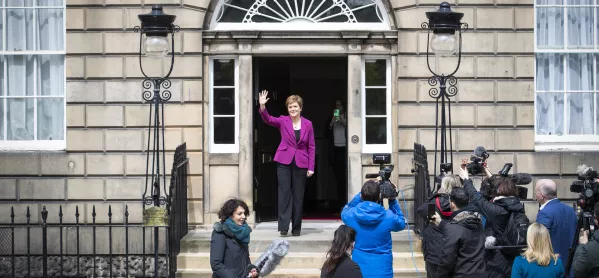- Home
- Video & Podcasts
- News
- WATCH: Sturgeon insists teachers’ judgement is key
WATCH: Sturgeon insists teachers’ judgement is key

First minister Nicola Sturgeon has insisted that students’ results in this year without national exams will be based on teacher judgement - despite one union saying that “teacher professional judgement has been taken away”.
Following Tes Scotland stories about the scramble to gather evidence of pupil attainment, and exam questions being shared by students on social media, Ms Sturgeon was asked several questions about education at today’s Scottish government coronavirus briefing.
While the briefing focused on the easing of various coronavirus restrictions, it also turned to schools: Ms Sturgeon sought to offer reassurance about the way qualifications were being awarded this year, saying the government was working “as hard as possible to get the right arrangement in place” and that, this year, qualifications would be awarded “on teacher judgement, not on past results, not on algorithms”.
But teachers and headteachers have taken issue with similar assertions in the past.
So, in a follow-up question, Tes Scotland suggested that, this year, teachers were not being asked for their professional judgement - rather, that they were responsible for issuing provisional results, which had to be based on evidence.
Speaking to Tes Scotland last week, the general secretary of the Scottish Secondary Teachers’ Association (SSTA), Seamus Searson, said that teachers needed to be told “not to tie themselves in knots gathering evidence” and to be given the flexibility to make sure students got the grades they deserved.
Mr Searson said a teacher might know a student is capable of achieving an A but, as a result of coronavirus disruption, might only have evidence for a C.
However, in response, Ms Sturgeon (pictured above after the SNP’s Scottish Parliament election victory last week) insisted it was true that the results would be based on teacher professional judgement, “but like any other judgement there is evidence required to inform that judgement, and then the teacher makes the judgement on the basis of that”.
Background: SQA warns of penalties for ‘exam’ details on TikTok
Related: Grade deadline move for ‘unduly disadvantaged’ students
Also today: Face masks still needed in Scottish schools next week
Ms Sturgeon also addressed the issue of exam questions being shared by pupils on social media after Tes Scotland revealed yesterday that a video posted on social media site TikTok had received 4,000 comments, with students discussing the question papers for everything from N5 art and geography, to Advanced Higher chemistry and physics.
The first minister said: “The SQA, I know, has issued an urgent communication reminding centres [schools and further education colleges] of the need to take steps to ensure the security of any assessment material. There was an incident over the weekend, I understand, of assessment material being shared on social media.
“Learners should only have access to the content of secure assessment material when they are completing assessments under supervision, and the SQA have taken steps to remind centres of that over the course of the last couple of days.”
On this year’s qualifications, she said: “We take all this really seriously. Young people have suffered more - not just in terms of their education, but the impact on their lives over the past year - than possibly any other group in our society, so these are things we need to continue to take really seriously, listen to young people and make sure we are working as hard as possible to get the right arrangements in place.
“The revised certification model for National 5, Higher and Advanced Higher, necessitated by the absence of exams this year, was published, I think, in February.
“The submission date for provisional grades has been extended to 25 June, providing more time for the gathering of evidence on pupil attainment.
“It’s important to remember the model was developed by the National Qualifications 2021 Group which includes teacher - EIS - representation.
“The group has been clear there is no requirement to replicate a full formal exam or prelim diet.
“We are awarding qualifications on teacher judgement, not on past results, not on algorithms, and the evidence for each individual learner doesn’t have to be the same, as long as it meets the conditions of assessment relative to the course.
“So this is an anxious time for young people, I recognise that, and great care has been, and will continue to be, taken to make sure they are supported as fully as possible.”
You need a Tes subscription to read this article
Subscribe now to read this article and get other subscriber-only content:
- Unlimited access to all Tes magazine content
- Exclusive subscriber-only stories
- Award-winning email newsletters
Already a subscriber? Log in
You need a subscription to read this article
Subscribe now to read this article and get other subscriber-only content, including:
- Unlimited access to all Tes magazine content
- Exclusive subscriber-only stories
- Award-winning email newsletters



